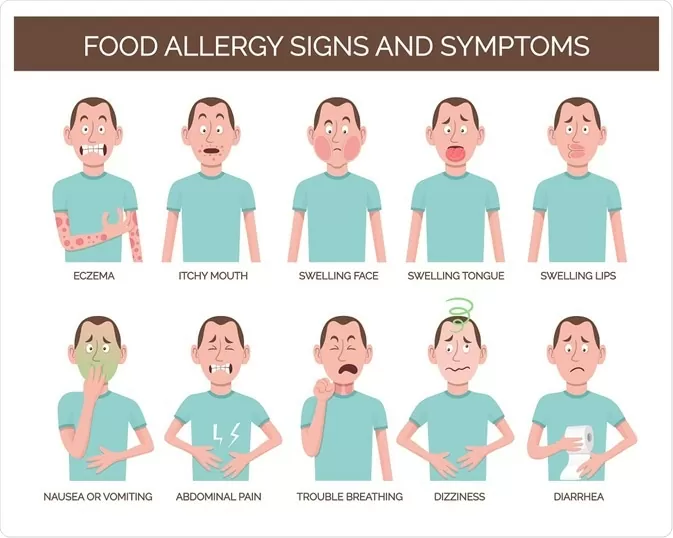What are the signs and symptoms of common food allergies?


Food allergies are becoming increasingly common, affecting millions of people worldwide. These allergies occur when the immune system mistakenly identifies certain proteins in food as harmful and launches an attack against them. The signs and symptoms of common food allergies can vary widely, ranging from mild to severe reactions. It is important to be aware of these signs and symptoms to ensure prompt recognition and appropriate management. In this article, we will explore the signs and symptoms of common food allergies, as well as the differences between food allergies, food intolerances, and food sensitivities.
Signs of Food Allergies
When a person with a food allergy consumes the allergenic food, their immune system reacts by releasing chemicals such as histamine. These chemicals trigger a range of symptoms that can affect different parts of the body. The signs of food allergies may include:
1. Skin Reactions:
– Hives (red, itchy bumps on the skin)
– Eczema (dry, itchy, and inflamed skin)
– Swelling of the lips, face, tongue, or throat (known as angioedema)
2. Respiratory Symptoms:
– Sneezing
– Runny or stuffy nose
– Coughing
– Wheezing or difficulty breathing
– Shortness of breath
– Chest tightness
3. Gastrointestinal Issues:
– Nausea
– Vomiting
– Abdominal pain or cramps
– Diarrhea
4. Cardiovascular Symptoms:
– Rapid heartbeat
– Low blood pressure
– Fainting or lightheadedness
5. Oral Symptoms:
– Itchy or tingling sensation in the mouth
– Swelling of the lips, tongue, or throat
Symptoms of Food Allergies
The symptoms of food allergies can vary in severity and onset time. Some individuals may experience immediate symptoms within minutes of consuming the allergenic food, while others may have delayed reactions that occur several hours later. Common symptoms of food allergies include:
1. Anaphylaxis:
– Anaphylaxis is a severe and potentially life-threatening allergic reaction that requires immediate medical attention. It can cause a combination of symptoms, including difficulty breathing, swelling of the throat, rapid pulse, dizziness, and loss of consciousness.
2. Digestive Symptoms:
– Nausea, vomiting, abdominal pain, and diarrhea are common digestive symptoms associated with food allergies. These symptoms may occur alone or in combination with other allergic reactions.
3. Skin Reactions:
– Hives, eczema, and angioedema are common skin reactions seen in food allergies. These symptoms can be itchy, uncomfortable, and may spread to different parts of the body.
4. Respiratory Symptoms:
– Wheezing, coughing, shortness of breath, and nasal congestion are respiratory symptoms that can occur in response to food allergies. These symptoms may resemble those of asthma.
5. Cardiovascular Symptoms:
– Rapid heartbeat, low blood pressure, and fainting are cardiovascular symptoms that can occur during a severe allergic reaction. These symptoms require immediate medical attention.
Allergic Reactions vs. Food Intolerance vs. Food Sensitivities
It is important to differentiate between food allergies, food intolerances, and food sensitivities, as they have different underlying mechanisms and symptoms.
– Food Allergies:
– Food allergies involve an immune system response to specific proteins in food. They can cause immediate and potentially life-threatening reactions. Allergic reactions are triggered by even small amounts of the allergenic food.
– Food Intolerance:
– Food intolerance occurs when the body has difficulty digesting certain foods or substances. It does not involve the immune system and is typically not life-threatening. Symptoms of food intolerance may include bloating, gas, diarrhea, and stomach cramps.
– Food Sensitivities:
– Food sensitivities are similar to food allergies but are generally less severe. They involve an immune system response, but the symptoms are often delayed and may be less specific. Common symptoms of food sensitivities include headaches, fatigue, joint pain, and skin problems.
Conclusion
Recognizing the signs and symptoms of common food allergies is crucial for early identification and appropriate management. Skin reactions, respiratory symptoms, gastrointestinal issues, cardiovascular symptoms, and oral symptoms are common signs of food allergies. It is important to differentiate between food allergies, food intolerances, and food sensitivities to ensure proper understanding and management of these conditions. If you suspect you have a food allergy, it is essential to consult with a healthcare professional for an accurate diagnosis and guidance on managing your condition.
Recent Posts
How do I create an engaging and informative online quiz or assessment?
Creating an engaging and informative online quiz or assessment can be a powerful tool for… Read More
What are the most effective methods for managing and reducing work-related stress in the hospitality industry?
Work-related stress is a common issue in the hospitality industry, where employees often face long… Read More
How can I improve my assertiveness and communication skills in a leadership position?
In a leadership position, assertiveness and effective communication skills are crucial for success. Being able… Read More
What are the key elements of a successful employee recognition and rewards program?
Employee recognition and rewards programs play a crucial role in motivating and engaging employees, as… Read More
How do I effectively manage and respond to customer feedback and reviews?
Customer feedback and online reviews play a crucial role in shaping a company's reputation and… Read More
What are the best strategies for effective time management as a stay-at-home parent?
Effective time management is crucial for stay-at-home parents who juggle multiple responsibilities on a daily… Read More